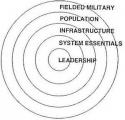The key to any strategy or endstate, in my opinion, is that it has to be feasible.
I don't think the following are feasible:
"A legitimate government" What does a legitimate government look like in a land that hasn't seen one since the early 1970's? And don't describe it from an American point of view, describe it from an Afghan point of view.
"Adequate security forces" - What's the definition of adequate? The entire country, plus the FATA is ungoverned. Karzai's span of control is measured in kilometers.
"an economic system not reliant upon narcotic production" - please identify legitimate options in a country with 85% illiteracy, few natural resources and literally no infrastructure. And then identify the length and costs of rehabilitating and educating the Afghan people and then implementing the plan.
"Stable enough to resist adventurist actions of its neighbors" - see above. How long, how much will it cost, and what is the definition of stability? Three armored corps with T72's, BMP-2's and 2S3's? An Air Force with more than three help pilots and a maintenance system that can sustain jet engines?
Time and money are political issues, and will drive the endstate and the strategy.
If we had unlimited time and money, you could really attack the issues of why Afghanistan is a mess. They would be:
1. reducing illiteracy and widening education. a 30 year process at minimum
2. with that, you can start limited infrastucture improvements, and then as more educated Afghans come into the workforce, start to teach them how to build and maintain infrastructure
3. With a more educated populace, Imam Hussain at the mosque can be countered and defeated within the propaganda and IO realm.
4. At home, any talk of quick or decisive action would be squelched. The loss of credibility from the political level to the individual voter level can almost never be rebuilt (see, no new taxes, mission accomplished, what is the definition of "is")
The political endstate is unacheviable because there is no short term relief for Afghanistan. With the amount of money and patience required, we can make it state #51 because that's about the only way it's going to happen.















Bookmarks